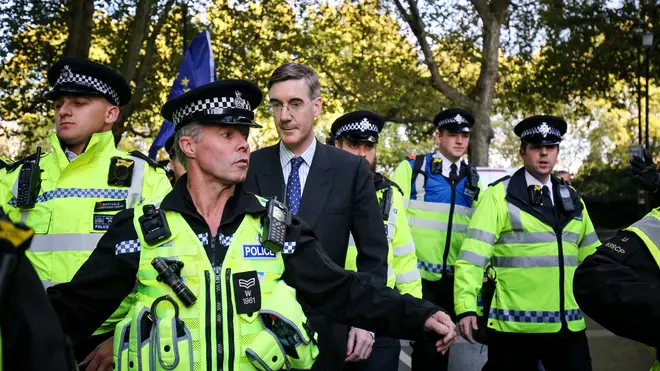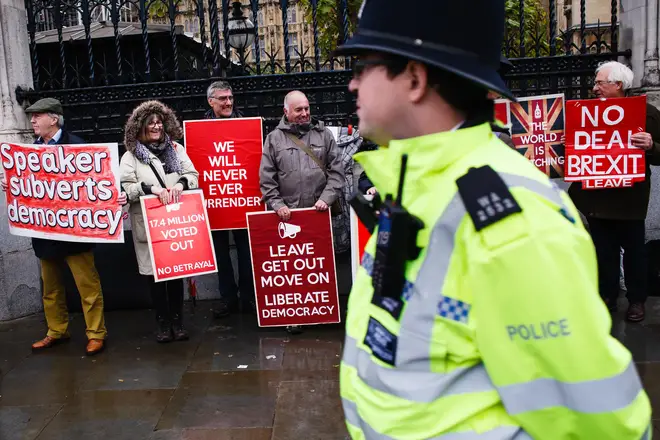
Jim Diamond 1am - 4am
20 May 2020, 06:42

The cost of keeping MPs safe has grown by 2,000 per cent in the past five years as politicians protect themselves against the fallout from Brexit and national security decisions, a report said.
The latest report by the Parliamentary Monitor at the Institute for Government reveals that between 2015/16 and 2017/18 the cost of MPs’ security assistance rose from just £171,000 to more than £4.5million.
The report said that while costs had started to decrease again in the past year, they remained “almost 2000% above pre-2015 levels” in 2018/19, with £3.5m spent on security assistance to Parliamentarians last year.
“This fall is because many of the costs that MPs had claimed for were one-offs – for example, the cost of fitting a new security alarm,” the IfG report found.
“As a growing proportion of MPs have now addressed their security needs, costs have started to fall.
“However, as the 140 new MPs elected in the 2019 election start to consider their physical security, the trend may reverse and costs may begin to climb again as MPs continue to experience and report threats to their safety.”
Since the 2015 general election, which David Cameron won with a manifesto pledging a referendum on Britain's membership of the European Union, the 109-page report found that security costs for MPs had dramatically increased.

The need for beefed-up security measures had been driven home, it said, by the murder of Labour MP Jo Cox before the 2016 referendum and the terror attack on Parliament in 2017.
The report, published on Wednesday, said a "damaging discourse" - promoted by the Government and also reflected in the media - that labelled rebel MPs "saboteurs" had seemed to "further fuelled growing levels of abuse of politicians on social media".

UK Police Equipment v US Police Equipment
"Between 2015/16 and 2017/18, the cost of MPs' security assistance rose sharply, from just £171,000 to over £4.5 million," the IfG report added.
"This steep rise was driven by a combination of factors. After deeply divisive debates in parliament about British military involvement in Syria in late 2015, the National Police Chiefs' Council recommended that all MPs adopt a standard package of security measures.
"In the last financial year, costs have begun to fall - although they still remain almost 2,000% above pre-2015 levels.
"In 2018/19, £3.5 million was spent providing security assistance to MPs - 23% below the previous year."

Ukip MEP’s Impromptu Brexit Protest Fails To Draw Big Crowds
Alice Lilly, a senior researcher at the IfG, said: "The 2017-19 parliament saw MPs and peers grapple with various important and high-profile issues - including Brexit, allegations of bullying and harassment and increased security concerns.
"Yet, at the same time, the conditions for reaching consensus - majority government and strong party loyalty - slipped away, making it more difficult for Parliament to function."
The publication stated that Downing Street incumbents' approach to scrutiny was a "worrying" aspect highlighted in the approach to Brexit, a finding that will raise concerns when MPs start to look to row back the additional powers handed to Government during the current coronavirus crisis.
"At times, the May and Johnson governments appeared reluctant to expose themselves to parliamentary scrutiny," said the analysis.
"With a return to majority government, there is a risk that Parliament's right to fulfil its scrutiny role could be weakened.
"On top of this, the vast powers given to the Government to respond to the coronavirus crisis, and uncertainty about whether parliament will be able to sit as normal due to social distancing measures, have reignited concerns about parliamentary scrutiny."

Hundreds of Police Head Toward Parliament Square
While current Speaker Sir Lindsay Hoyle has distanced himself from the actions of his predecessor John Bercow, the report calls for Parliament to review the "powerful discretion" afforded to the Commons speaker when a minority government is in place.
It "remains uncertain" whether precedents set by former speaker John Bercow, including allowing opposition parties to use a "humble address" to demand ministers hand over documents or allowing emergency debates to be utilised to wrestled away the Commons agenda from the Government, "should be sustained", said the report.